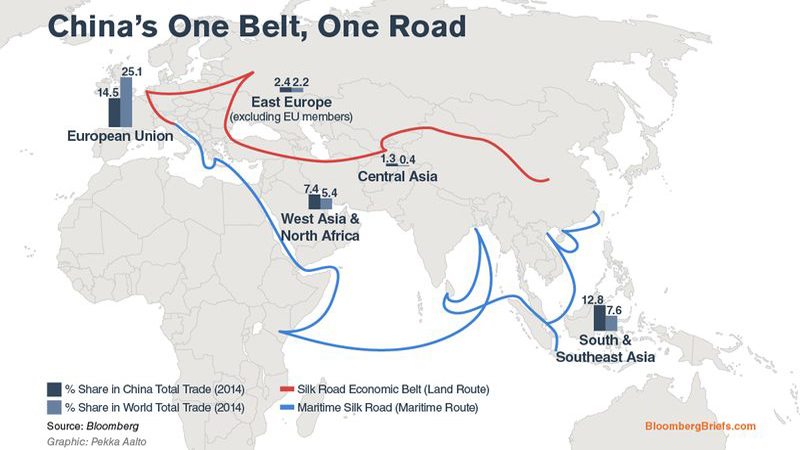At the 19th National Congress of the Communist Party of China (CPC) held in Beijing from 18 to 24 October, crucial decisions were made about the domestic system and global policy matters. The Congress decided to enshrine the thoughts and ideas of President Xi Jinping as an integral part of CPC’s constitution, which elevated him to the status of Chairman Mao Zedong and Deng Xiaoping. President Xi will continue his dynamic leadership in the next mid-term for five years.
The Belt and Road Initiative (BRI) is Jinping’s grand strategy which rolled in 2013. The BRI is one of main reasons behind enshrining Jinping’s into the party’s constitution on which he has been banking over the past four years in his dynamic foreign policy preferences. His initiatives have now become part of the CPC’s constitution which means China will continue to pursue the BRI in the long run even when Jinping would no longer be in power.
Many may not understand this, but it is a fact that the BRI has been written with the Chinese Socialist characteristics as a share-destiny of a win-win cooperation among nations across the world. Other than India, hardly any nation opposes it. Even Japan may participate once the normalisation takes place between China and Japan with fair chances after the landslide election victory of Prime Minister Shinzo Abe on 22 October. This is a great message and opponents must understand the eternal divinity of the BRI in China’s internal politics and its future foreign policy goals especially with regional players.
Currently, it appears that the Sino-Indian rift over the BRI will continue to widen in the days to come. This will continue until India changes it’s policy
The BRI is strategy is not aimed at seeking dominance but seeking cooperation. Will China ever re-amend its CPC constitution to accommodate India? A country-specific amendment seems unlikely in the future, which means that India needs to adjust its policy toward the BRI to cultivate better relations with China.
This also means the BRI’s flagship project (CPEC) will gain more momentum meaning India also needs to adjust its policy toward CPEC. In the prevailing circumstances, it is not possible for India to oppose BRI and CPEC. An internal policy adjustment would be essential for India to promote regional harmony and to promote ties with China and Pakistan.
India’s issue with CPEC is that it goes through a part of Kashmir, which India thinks belongs to it. China disagrees. The BRI passes all five continents. The initiative is not just trade connectivity; it is people to people and civlisational contact and integration among different religions, races, cultures and linguistic groups. In short, China is trying to create a true global village.
The initiative is not just about trade connectivity; it is also about people to people contact and integration among different religions, races, cultures and linguistic groups. In short, China is trying to create a true global village
Jinping and Indian Prime Minister Narendra Modi have completely opposing views on this global connectivity. This is the beginning of a new bone of contention between the CPC and the Bharatiya Janata Party (BJP). Jinping also wants connectivity with India so that it can access the Indian Ocean through the BCIM (Bangladesh-India-China-Myanmar) corridor.

India was the lone absentee at the BRI Forum held in Beijing, where many world leaders reiterated their resolve on being a part of the BRI. This was a major setback to India which resulted in isolation from the global community.
The writer is Director of the China-Pakistan Study Center at the Institute of Strategic Studies Islamabad. He writes on East Asian affairs
Published in Daily Times, November 1st 2017.
